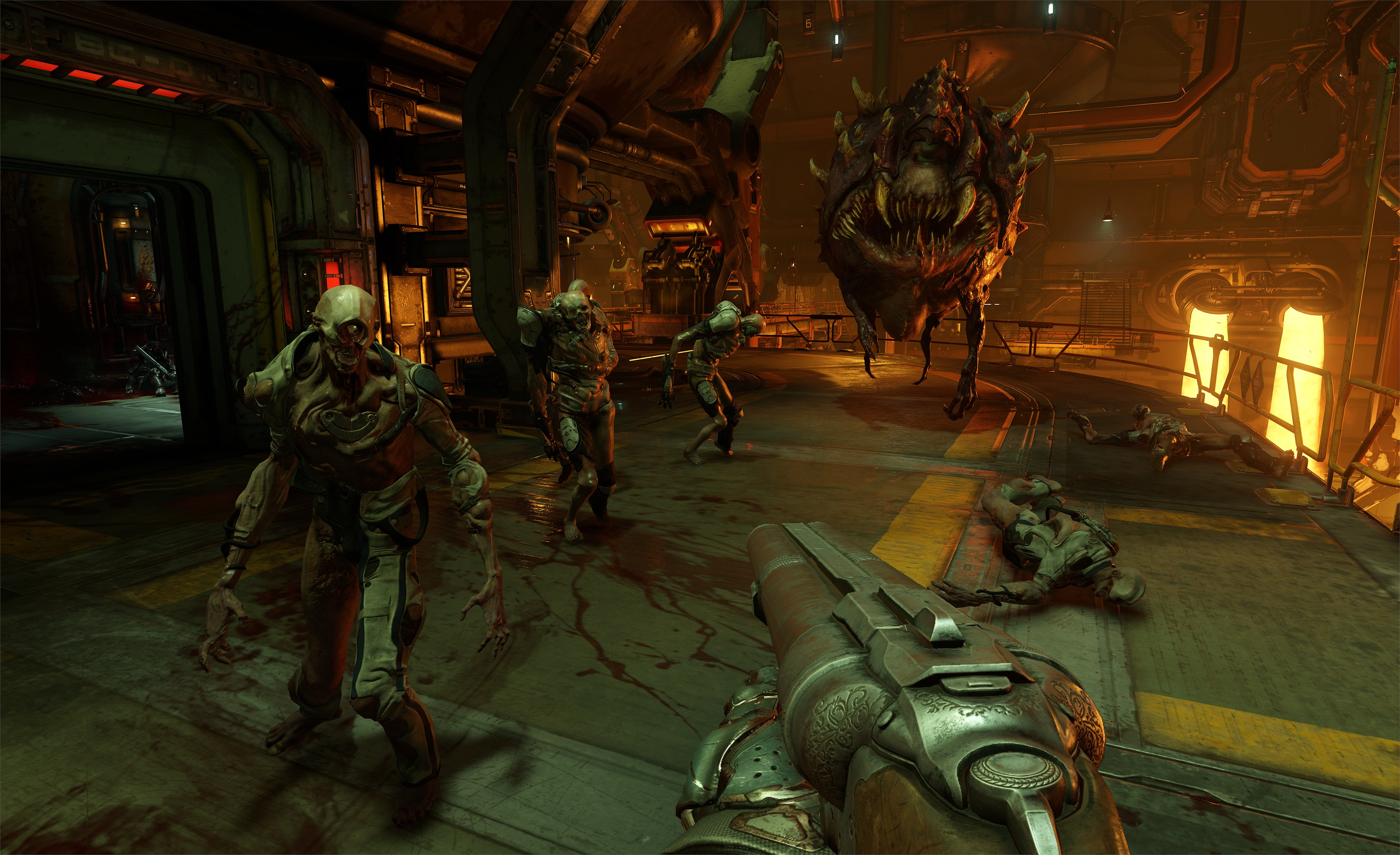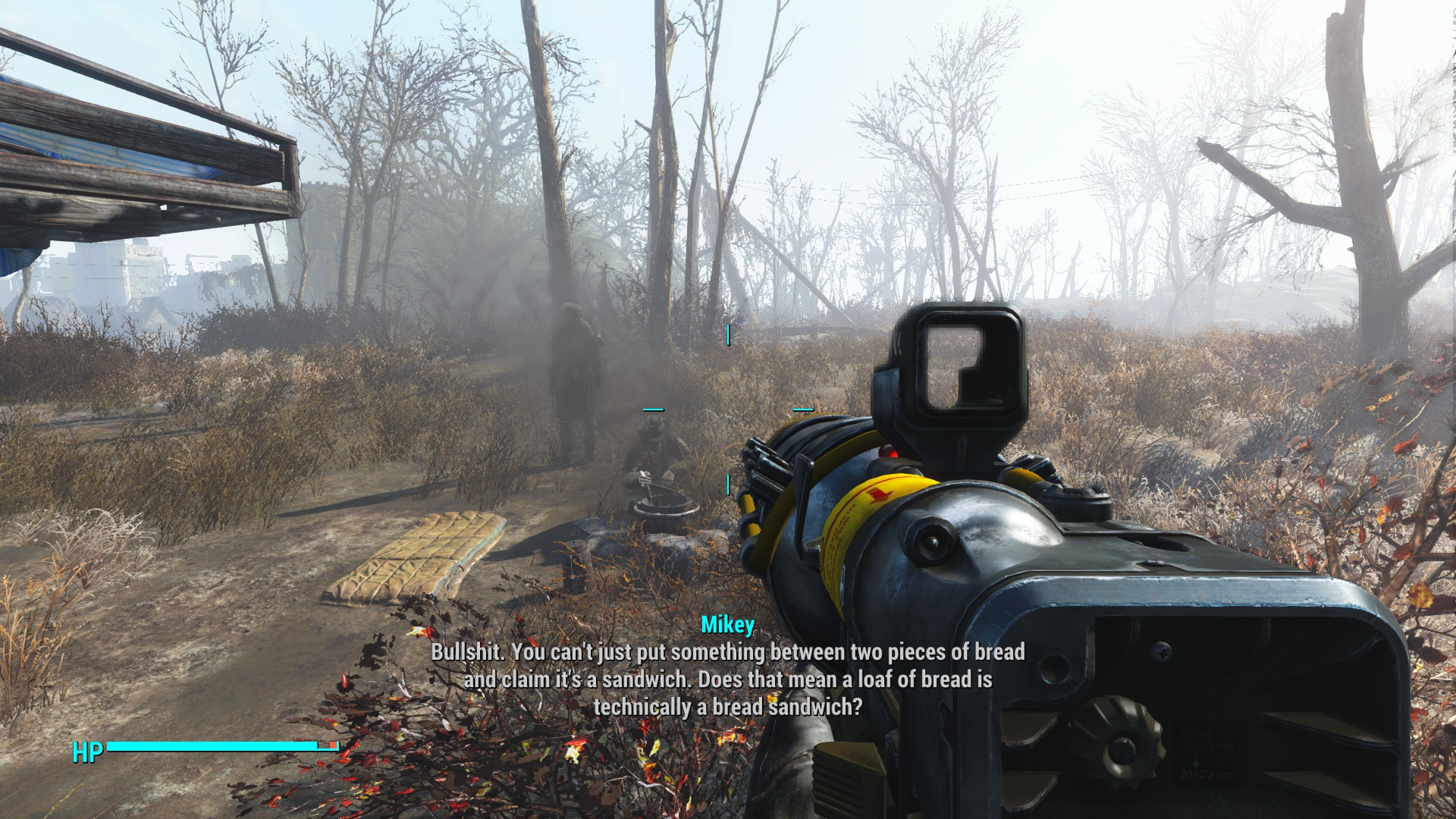Living Life Down the Barrel of a Gun

For all of the broad range of experiences that games can offer to us, the actual ways in which we are allowed to interact with them is rather limited. Most game screens look remarkably similar from a UI point of view. There is some sort of health bar, possibly a map or objective indicator in one corner, maybe a crosshair in the center of the screen, but invariably, the bottom right corner of the screen is almost always taken up by a gun. There are a few games that don’t follow this, but in the mainstream, first-person games that don’t shove a gun into your hands are the vast minority. And if your hands are filled with a gun, they have a knife, or a sword, or a bow, your weapon is offscreen, waiting to be pulled up with a single button press, aching to strike out at someone.
We are always ready to bring violence to someone, always looking to solve a problem by bashing it, stabbing it, or shooting it, and can we really be blamed? If someone has a hammer, then every problem looks like a nail. If someone has a gun, then every problem looks like a target. Every conversation has a gun in the middle of it, and that changes the whole dynamic.
This is true to a somewhat lesser extent in third-person games, where you are still constantly armed and urged to solve all of your problems with violence, your weaponry just isn’t such a large part of your vision. It might be on your back or in your hands, but it isn’t taking up a third of your screen like it is in many first-person games. The problems still exist, just not at the same level.
It's only made worse by the fact that the non-player characters (NPCs) don’t even blink at this. Trying to barter for food with a shotgun in their face, or talking to a traumatized hostage while dual-wielding submachine guns, breaks the immersion. You want people to react, but they rarely do because having guns out is your default state. It was a nice touch in Skyrim to have guards comment about your magical flaming hands, or your supernatural screams, or your ridiculous weaponry. It made it feel like you should put your gear away when you were walking through cities, as it understandably made guards nervous.
DOOM played this for laughs, the main character being an almost personification of a stereotypical game hero. You smash important tech just to interact with it and every time a helpful robot gives you a gun upgrade, you punch it right in its face. For no reason. You are a walking cliché, a 7-foot tall dealer of death, recklessly disregarding all advice that upon second listen, is actually rather sound. Maybe you shouldn’t destroy the entire facility that is harvesting hell energy, as it is the only option for Earth to go forward. But instead, you smack Hell in the face with a double-barreled shotgun, and we love the game for it.

Compare this to Fallout 4, where you are talking to important leaders with a shotgun pointed directly into their face, or getting healed by doctors while you tote a minigun, and no one bats an eyelash. You are supposed to be a sympathetic father on a quest to find his lost son, but instead you lose all of that the second you start running around blasting everything in your path. You are a soldier with a story, not a parent on a mission.
Part of this is by virtue of the games that get made in the AAA space. They are so focused on violence and action because it is marketable. Guns sell, conversation doesn’t. Part of this is a general reluctance on the part of the audience to branch out and explore new things. We are used to viewing life down the barrel of a gun, solving all of our problems with strategically timed headshots or chainsaws, and we aren’t looking to change, even if it stifles creativity.
In recent years, games have gotten better about this, moving away from this laser focus on combat into other realms, especially outside of the AAA space. 2016’s The Witness was a massive critical and commercial success, and only had puzzles for you to solve, no guns required. The same could be said about Grow Up, a Ubisoft published platformer that had you crawling all over a cartoon planet to put your spaceship back together.
Yet these small titles are still eclipsed by monstrosities like Call of Duty, Battlefield, Titanfall, or DOOM. Where the only time that you won’t have a gun is when you aren’t in control of your character. Your experience is one of violence, and we let nothing get in the way of that.
_____________________________________________

Tom has been writing about media since he was a senior in high school. He likes long walks on the beach, dark liquor, and when characters reload guns in action movies.
You Might Also Like:
The Makings of a Good Horror Movie KillDying to Win - Death as a Gameplay Mechanic
Death Doesn't Matter Anymore
_____________________________________________